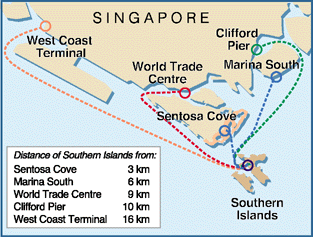| |
The
Business Times, 13 Mar 04
Singapore may allow a casino to open after
all
By Chuang Peck Ming
Govt mulls over option as part of major resort, residential project
 In
a major departure from its past thinking, the government may allow
a casino on one of the southern islands to woo international talent,
tourists and investments. Expanding on Deputy Prime Minister Lee Hsien
Loong's announcement on Wednesday to permit the sale of landed properties
at Sentosa Cove to foreigners, Trade and Industry Minister George
Yeo yesterday disclosed plans for a 500-hectare resort and residential
development linking Sentosa by boat or bridge to the Southern Islands
three kilometres away. In
a major departure from its past thinking, the government may allow
a casino on one of the southern islands to woo international talent,
tourists and investments. Expanding on Deputy Prime Minister Lee Hsien
Loong's announcement on Wednesday to permit the sale of landed properties
at Sentosa Cove to foreigners, Trade and Industry Minister George
Yeo yesterday disclosed plans for a 500-hectare resort and residential
development linking Sentosa by boat or bridge to the Southern Islands
three kilometres away.
The development is modelled on Atlantis on Paradise Island in the
Bahamas, but Brigadier-General Yeo said it will be uniquely Singapore.
It will feature a comprehensive range of facilities including attractive
beaches, hotels, private residential homes, marinas, sports complexes,
convention centres, health spas, retail and food and beverage outlets.
And it may include a casino.
'We are keeping an open mind on what to have in this development,
including the possibility of having a casino,' BG told Parliament
during the debate on his ministry's budget. 'What we envisage is an
international facility separate from Singapore but accessible to all
Singaporeans, with more relaxed rules to attract international talent,
visitors and investments.'
If Singapore goes ahead with the casino, thus scrapping a long-standing
ban, BG Yeo said the government will put in place control measures
to limit its access to Singaporeans and to prevent organised crime.
Singapore now allows lotteries and betting on horse races but has
repeatedly rejected suggestions for a casino, arguing that the social
dangers outweigh the potential for profit.
Taxes from lotteries make up a tenth of the government's $16.5 billion
tax revenue, estimates Song Seng Wun, an economist at GK Goh Research.
'The government is persuaded that economic benefits from more government
revenue may in some way give them more flexibility with the uncertain
economic cycles these days,' he told Bloomberg News. 'This is one
stone they're certainly turning."
Observers say a casino may not only help maintain Singapore's position
among the front rank of cities, but will also help provide jobs in
an economy where the unemployment rate was close to a record high
in the past year. It will put Singapore in competition with Malaysia's
casino run by Genting Bhd, Asia's largest publicly traded casino group
by market value, and with gaming facilities in Macau.
On other fronts, Singapore is facing some new challenges from neighbours.
BG Yeo singled out Thailand's attempt to develop oil trading to rival
Singapore's. 'Thailand's value proposition is in part driven by the
desire of the North-east Asian countries, which are highly dependent
on oil shipped from the Middle East through South-east Asia, for greater
energy security,' he said.
Singapore still has the edge. 'Oil trading, bunkering and refining
are traditional strengths of Singapore,' BG Yeo said. 'Ships have
called on Singapore for bunkering since the days of the steamship.
Over the years, we have also built Singapore up to be the third biggest
oil-trading centre after London and New York.'
Still, he cautioned, Singapore must watch its costs and continue to
provide a global business-friendly environment. 'We are studying Thailand's
moves and, where necessary, will respond to them in a timely manner.'
According to BG Yeo, Singapore's external space is expanding.
Asean is integrating faster than expected and Singapore's links to
China and India is also growing rapidly. At the same time, Singapore's
free trade pacts are opening more opportunities. 'We must encourage
more of our companies, especially our SMEs, and more of our young
people, to venture overseas.'
BG Yeo said that if Singaporeans can make the breakthrough in their
mindset and fan out from Singapore, the country's gross national product
in 10 years' time will be significantly greater than its gross domestic
product, which takes into account only income that arises within the
geographical confines of the country but not income earned abroad
as in the national measure. |
|